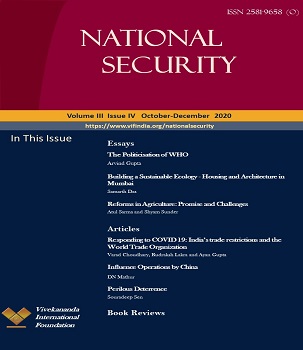About the Issue
The twin threats posed by the spread of the Covid-19 virus and the open hostilities and military build-up by an aggressive and expansionist China in Ladakh have remained the focus of national headlines over the past six months in India. No other country currently, and rarely, faces such a combination of high threats that span across the military to the human security domains. These are perilous times that the country is going through and the government has confidently attempted to grapple with the rising challenges. India’s security, economic and foreign policies are as a result undergoing unprecedented changes.
This issue of National Security analyses the challenges and the policy responses from diverse perspectives. Arvind Gupta in his essay argues that multilateralism is facing an extraordinary crisis as a result of great power rivalry and politicization of global institutions. He underlines the culpability of China in covering up and delaying reporting of the virus, and the uncritical support it received from the World Health Organization (WHO), as being the principal reasons for keeping the international community unprepared to deal with the rapid spread of the virus. The other two essays deal with important issues that have come to the fore as a result of the effects of the virus on health, urban life, employment, incomes, and migration. Samarth Das in his essay on redesigning urban spaces in Mumbai --that has been the most badly virus-hit city in the country—lays out an alternative and feasible plan than one being pursued currently with deleterious impact on the people and the environment. Atul Sarma and Shyam Sunder explain and assess the sweeping agrarian reforms introduced by the government, and the challenges that need to be overcome.
Choudhary, Lakra and Gupta in their long and excellently argued article focus on the trade restrictions imposed by India in the health and pharmaceutical sectors to deal with the Covid-19 emergency, and their legitimacy under the WTO rules. D.N. Mathur probes the influence operations and hybrid warfare being undertaken by China against leading democracies, including India, the United States and Australia. While Souradeep Sen in his well-argued article calls upon both India and China to pursue the logic of contingent realism. He contends that the pandemic and its massively devastating after-effects would act as a new form of deterrence between the two Asian states—a ‘perilous deterrent’ that could restrain them from engaging in war.
They all make strong contributions to both the policy and the theoretical debates to make this issue of NS interesting and noteworthy.
Letters and Comments
Readers can share their views on National Security by e-mail to: the Editor, National Security. E-mail: [email protected]
For more information go through submission guidelines
Editor's Note
Editorial Board
International Editorial Advisory Board
Contents : Vol. III Issue IV | October - December 2020
Essays
The Politicisation of WHO | Arvind Gupta
Building a Sustainable Ecology - Housing and Architecture in Mumbai | Samarth Das
Reforms in Agriculture: Promise and Challenges | Atul Sarma and Shyam Sunder
Articles
Influence Operations by China | DN Mathur
Book Reviews
The Bangladesh Story - Travails and Triumphs | Pratim Ranjan Bose
Trump, Xi and the Making of the New Cold War | Prerna Gandhi
Important Information
- The copyright of National Security rests with VIF.
- Submissions to National Security should be original and not published elsewhere or submitted for publication elsewhere. The Publication reserves the first right of refusal.
- The submissions will be peer-reviewed/refereed as well as undergo a plagiarism check.
- The Editor/Institute reserves the right to make a final decision on the publication, National Security post-review as well as the right to make alterations.
Selected contributors will be informed of the decision to include their articles in the forthcoming Publication via email. - If the author seeks to use an article published in National Security as part of another work, then you will need to get the requisite permission from the Publication, National Security.
All Rights Reserved.
No part of this publication may be reproduced, stored in a retrieval system, or transmitted in any form, or by any means- electronic, mechanical, photocopying, recording or otherwise- without the prior permission of VIF.


Post new comment